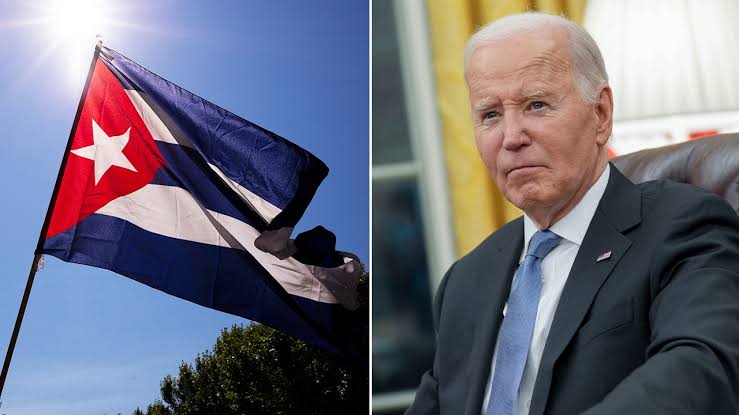The decision would undo a move from Donald Trump’s first term that labeled Cuba a ‘state sponsor of terrorism’.
With less than a week remaining in office, President Joe Biden is set to lift Cuba’s designation as a “state sponsor of terrorism,” according to anonymous sources familiar with the decision. The Associated Press reported the news on Tuesday, citing US officials. However, the move is expected to be more symbolic than a significant policy change.
With President-elect Donald Trump set to take office on January 20, the decision to remove Cuba’s terrorism designation may soon be reversed. Nonetheless, the Biden administration moved forward, informing Congress of its intentions.
“We have completed an assessment and found no evidence to support Cuba’s designation as a state sponsor of terrorism,” a White House official told AFP.
Cuban officials welcomed the announcement, calling it long overdue. On social media, Cuban Minister of Foreign Affairs Bruno Rodríguez described Biden’s move as “positive” but “limited” in effectiveness.
“Cuba should never have been included on the arbitrary list of state sponsors of terrorism,” he wrote. “It was a politically motivated designation with severe consequences for the Cuban people, damaging the economy, causing shortages, and driving migration to the U.S.”
This is not the first time Cuba’s terrorism designation has been lifted and reimposed. Republicans quickly expressed their opposition to the move.
Senator Ted Cruz of Texas, a Cuban American, called the decision “unacceptable,” stating, “The terrorism perpetrated by the Cuban regime has not stopped. I will work with President Trump and my colleagues to reverse this decision and mitigate its impact.”
Al Jazeera correspondent Alan Fisher, reporting from Washington, explained that Tuesday’s decision would allow Cuba to receive humanitarian aid from U.S. organizations. “Humanitarian groups, church organizations, and human rights groups can now send aid to Cuba without facing U.S. sanctions,” Fisher noted.
Alongside the removal of the terrorism designation, Cuba announced the release of 553 prisoners, many of whom were likely involved in the 2021 anti-government protests.
Cuba was first labeled a “state sponsor of terrorism” in 1982 under President Ronald Reagan, who sanctioned the country for its history of supporting guerrilla groups and terrorists. The U.S. Department of State states that Cuba provided safe haven, training, and financial backing to such groups.
The “state sponsor of terrorism” designation for Cuba was imposed during the Cold War, when U.S.-Cuba relations were severed due to Cuba’s ties with the Soviet Union. This designation further isolated Cuba, restricting its financial transactions with U.S. institutions and blocking U.S. aid. As of Tuesday, Cuba was one of just four countries, alongside North Korea, Iran, and Syria, on the U.S. list.
Biden’s decision mirrors Obama’s 2015 move to remove Cuba from the list, part of a broader effort to improve relations. Obama’s policy was based on Cuba’s assurances not to support international terrorism, and in 2015, he also re-established diplomatic relations.
However, Trump reversed these policies in 2017, reinstating the designation in his final days in office, accusing Cuba of harboring terrorists. The Cuban government condemned the decision as “hypocrisy” and “political opportunism.”
The “state sponsor of terrorism” label for Cuba was first imposed during the Cold War due to Cuba’s ties with the Soviet Union, isolating the country by restricting financial transactions with U.S. institutions and blocking aid. As of Tuesday, Cuba was one of only four countries on the U.S. list, alongside North Korea, Iran, and Syria.
Biden’s decision to remove Cuba from the list echoes Obama’s 2015 move, which aimed to improve relations. Obama’s policy was based on Cuba’s pledge not to support international terrorism, and it also led to the re-establishment of diplomatic ties.
However, Trump reversed this in 2017, reinstating the designation and accusing Cuba of harboring terrorists. The Cuban government condemned the move as “hypocrisy” and “political opportunism.”
However, Senator Rick Scott of Florida, with many Cuban refugees in his state, criticized this move as an “unacceptable risk.” Senator Marco Rubio, with Cuban heritage, also opposed any rollback of restrictions, previously calling Obama’s efforts a “one-sided concession.”
Al Jazeera’s Alan Fisher pointed out that Biden had criticized Trump for reinstating the designation late in his presidency. Tuesday’s decision marks a role reversal, with Trump now potentially able to undo Biden’s actions if he returns to office. Fisher noted that although it’s not easy, Trump could use executive orders to reverse Biden’s move early in his second term, highlighting the irony of Biden making a similar decision as Trump did.
إدارة بايدن من المقرر أن تزيل تسمية "الإرهاب" لكوبا

